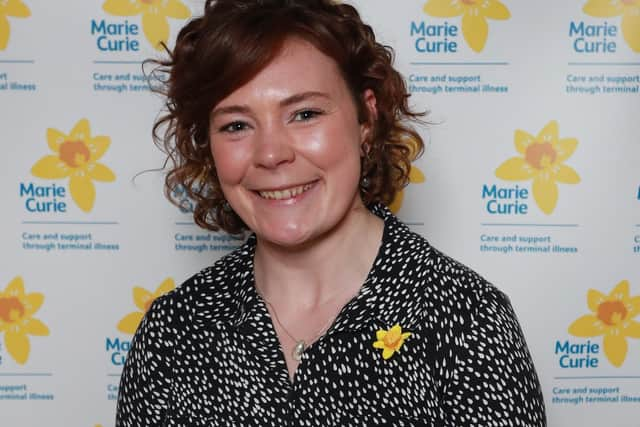Palliative care strategy is a crucial opportunity to better support patients - Ellie Wagstaff
As soon as she told me, I rushed home from London in the car at 2am with my three young children.
My mum knew she had terminal cancer and that she was going to die, but she also knew that she didn't have any money to pay for anything - including her funeral. Because my mum didn't have a financial safety net, there was no income when she was diagnosed. It was really difficult for us to manage as a family.
Advertisement
Hide AdAdvertisement
Hide AdI would drive to Scotland with the children and stay for five days while my husband was at work. If we'd had more money, we could have arranged childcare. The cost of the travel, flights and looking after my mum in the hospital was huge.


My mum lived on the fourteenth floor of a tower block. The lift only went to the thirteenth floor. Moving back home with all the equipment she would have needed would have been practically impossible. The space would have been too small for me, my mum and three children and we couldn't afford childcare to allow me to focus on caring for her.
In the end, she was transferred to a hospice ten days before she died. The hospice was brilliant, and I'm so glad she didn't die in hospital, but I know she would have wanted to be at home. I just couldn't do that for her with what we were offered.
Linda’s story is told by her daughter, Nicola (from Dying in the Margins, a research study by University of Glasgow and Marie Curie which explores the reasons for unequal access to dying at home for the socio-economically deprived).
It highlights the multiple, cross-cutting issues at end of life, which led to Linda being unable to have the end of life experience she really wanted; to die at home.
By 2040, up to 10,000 more people will be dying with end of life support needs in Scotland, and at least two thirds will be dying in community settings; in people’s homes, hospices and care homes.
The rapid increase of deaths in community settings throughout the pandemic provided insight into what this could look like; services, patients, families and carers were overwhelmed, and let down in many cases.
Looking to the future and beyond the provision of palliative care itself, this will also mean continually increasing financial pressures for people affected by terminal illness and an inevitable risk of poverty, greater unpaid care responsibilities, health and social care workforce pressures, and bereavement support, among others.
Advertisement
Hide AdAdvertisement
Hide AdThe Scottish Government’s upcoming palliative care strategy is a crucial opportunity which must be taken to support the entirety of a person’s end of life journey.
Palliative care is at the heart of that, but Government must look much wider to address overlapping end of life issues simultaneously, all of which have become significantly more acute in the last three years from the pandemic and cost of living.
Government must support the strategy with sustainable resources to deliver it, otherwise experiences like Linda and Nicola’s will continue to be the norm. This is unacceptable, and needs immediate action.
Ellie Wagstaff, Senior Policy Manager, Marie Curie
Comments
Want to join the conversation? Please or to comment on this article.